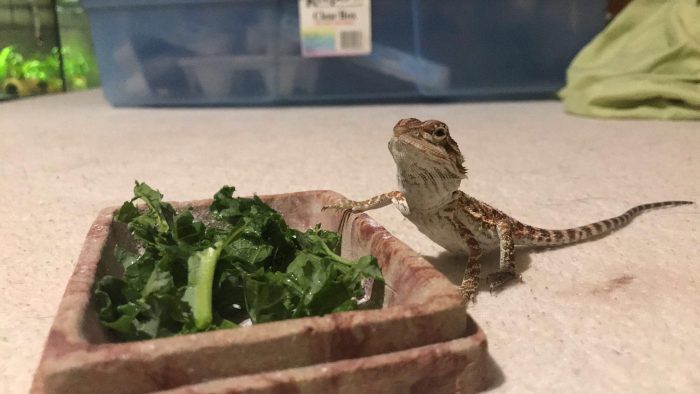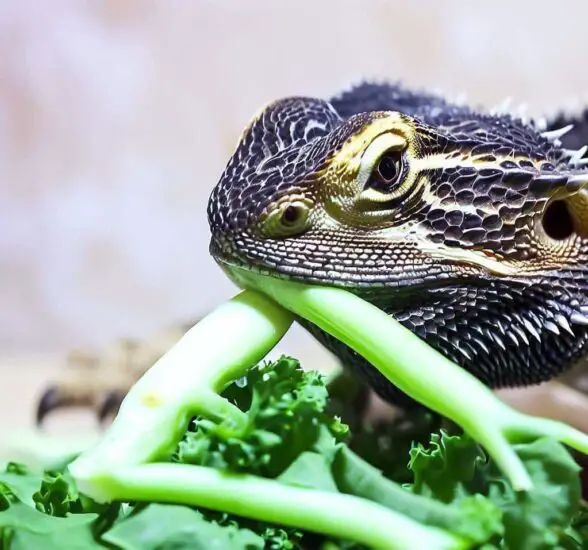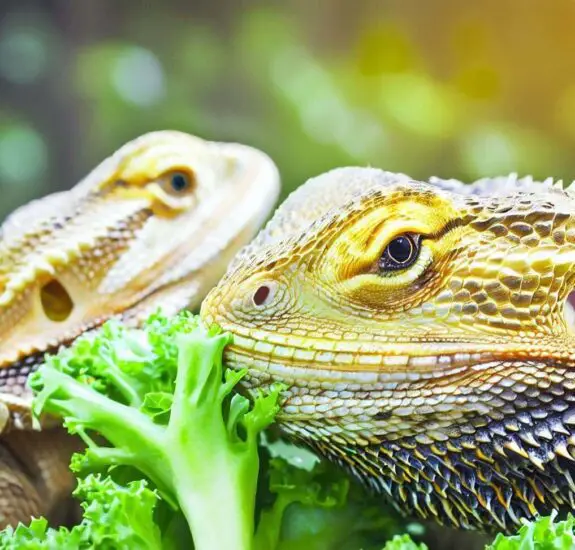
Welcome to the fascinating world of bearded dragons, a rare reptile pet that has captured the hearts of many pet owners with its lovable personality and unique physical characteristics. Can Bearded Dragons Eat Kale? Understanding their food requirements and preferences is essential for ensuring their well-being and longevity as responsible guardians.
Because bearded dragons are omnivore animals, their varied diet includes both plant and animal products. Making a balanced diet is therefore essential for maintaining good health. The “kale dilemma” among owners, meanwhile, centers on whether this leafy green is good for or bad for their reptile companions.
A well-rounded diet for bearded dragons typically consists of leafy greens, vegetables, fruits, insects, and occasionally, small vertebrates. This varied selection caters to their complex nutritional requirements, which include essential vitamins, minerals, and proteins.
Kale, a nutrient-packed superfood for humans, presents a controversial stance when feeding bearded dragons. While it contains beneficial nutrients such as calcium, it also harbors oxalates, which can hinder calcium absorption and lead to potential health issues.
Bearded dragons, fascinating reptilian companions, showcase a diverse dietary behavior that sets them apart from other pets. These scaly wonders fall under the category of omnivores, which means they possess an eclectic taste for both plant-based and animal-based foods, setting the stage for a captivating culinary journey.
Unlike strict herbivores, bearded dragons have a more flexible approach to their food choices. While they relish leafy greens, vegetables, and fruits, they also exhibit a fondness for insects and small vertebrates. This adaptability to various food sources allows for a well-rounded and exciting menu.
Maintaining a balanced diet is essential for the overall health and longevity of your bearded dragon. Adequate nutrition ensures proper growth, vibrant colors, and optimal organ function, contributing to their well-being and quality of life.
 Can Bearded Dragons Eat Kale?
Can Bearded Dragons Eat Kale?
For these reptiles, certain key nutrients hold the utmost significance. Calcium is vital for bone health and preventing metabolic bone disease, while vitamin D3 aids in calcium absorption. Additionally, protein from insects supports muscle development and growth.
Delve into the leafy realm of kale, a vibrant superfood that has garnered attention for its remarkable nutritional profile. As you consider whether bearded dragons can eat kale, exploring its composition sheds light on the potential benefits it may offer these scaly companions.
Kale boasts an impressive array of nutrients that contribute to its superfood status. Rich in vitamins A, C, and K, it also contains essential minerals such as calcium, potassium, and iron. Moreover, it serves as a source of dietary fiber, aiding in digestion for both humans and reptiles alike.
Vitamin A, crucial for vision and immune support, promotes overall well-being in bearded dragons. Vitamin C acts as an antioxidant, protecting against oxidative stress, while vitamin K supports blood clotting and bone health. The presence of calcium ensures strong bones and proper muscle function, essential for these active reptiles.
Incorporating kale into your bearded dragon’s diet, when done in moderation, may offer a myriad of advantages. Its nutrient-rich profile aids in supporting their immune system, promoting healthy skin and scales, and bolstering bone density.
As you explore the question, “Can bearded dragons eat kale?”, it’s essential to be aware of potential risks associated with this leafy green. While kale boasts numerous nutrients, it also contains oxalates, which can pose concerns for your scaly companion’s health.
Oxalates are naturally occurring compounds found in kale and certain other vegetables. When consumed in high quantities, oxalates can bind with calcium, hindering its absorption in the body. This can lead to calcium deficiency, a significant issue for bearded dragons who rely on this mineral for bone strength and muscle function.
Excessive oxalate consumption can increase the risk of developing metabolic bone disease (MBD), a serious condition affecting the skeletal system. MBD can manifest in deformities, weakened bones, and mobility issues, significantly impacting your pet’s quality of life.
Being vigilant about your bearded dragon’s health is crucial. Signs of oxalate-related health issues may include lethargy, loss of appetite, and difficulty moving. If you observe any concerning symptoms, seek prompt veterinary care to address potential complications.
Remember, while kale can be part of a varied diet for bearded dragons, it should be offered in moderation alongside other safe greens and vegetables. Prioritizing a balanced and well-researched diet ensures your scaly friend thrives in the best possible health.
 Can Bearded Dragons Eat Kale?
Can Bearded Dragons Eat Kale?
As the kale debate continues for bearded dragon owners, one crucial factor to consider is moderation. While kale can offer valuable nutrients, it should be provided in controlled amounts to ensure your scaly companion’s well-being.
To strike the right balance, limit kale intake to occasional treats. A small portion, about the size of your dragon’s head, once or twice a week is sufficient. This approach prevents the risk of excessive oxalate consumption and safeguards calcium absorption.
Proper preparation is vital to ensure kale is safe for your pet. Thoroughly wash the leaves to remove any potential pesticide residue, and opt for organic kale when possible. Chop the leaves into manageable pieces, making it easier for your dragon to consume.
Maximize the nutritional benefits by blending kale with a variety of safe greens and vegetables. Collard greens, mustard greens, and dandelion greens are excellent choices to create a well-rounded and enticing meal for your bearded dragon.
Remember, a diverse and balanced diet is the key to your bearded dragon’s thriving health. Offering kale as part of a thoughtfully curated menu will allow your scaly friend to enjoy its benefits while minimizing potential risks.
While the kale question lingers for bearded dragon owners, rest assured that there are plenty of safe and nutritious alternatives to consider. Diversifying your scaly friend’s diet ensures they receive a spectrum of essential nutrients for optimal health.
Leafy greens like kale provide crucial vitamins and minerals, but other greens are equally beneficial. Collard greens, rich in vitamins A and K, support vision and blood clotting. Mustard greens offer a dose of calcium, essential for strong bones, while dandelion greens provide vitamin C, promoting immunity.
Each alternative green brings unique benefits. Turnip greens offer antioxidants, while escarole aids in digestion. Arugula is a good source of vitamin C, and watercress packs iron for circulation.
Incorporating a variety of safe greens into your bearded dragon’s diet fosters well-rounded nutrition. Rotate greens regularly to prevent boredom and maximize nutrient intake.
Ultimately, exploring safe alternatives allows your scaly companion to enjoy a delectable and nutritious feast, promoting their overall well-being and happiness.
In the realm of bearded dragon care, understanding the significance of calcium and phosphorus is paramount for your scaly companion’s well-being. Striking the right balance between these essential minerals is crucial to prevent potential health complications.
Maintaining an appropriate calcium-phosphorus ratio is vital for proper bone health and overall physiological function. A ratio of 2:1 (calcium to phosphorus) is generally considered optimal for bearded dragons.
While calcium is abundant in many leafy greens, phosphorus can be found in higher quantities in certain protein-rich foods. Ensuring your dragon’s diet includes both calcium-rich greens and phosphorus-balanced insects is key to meeting their nutritional needs.
A calcium deficiency can lead to the development of metabolic bone disease (MBD), a debilitating condition that affects bone density and structure. MBD can result in deformities, fractures, and impaired mobility.
Ensuring your bearded dragon receives proper nutrition is essential for its well-being, and sometimes, a well-balanced diet alone might not be enough. That’s where supplements come into play, especially when it comes to crucial minerals like calcium and phosphorus.
Supplements serve as a valuable addition to your dragon’s diet, providing specific nutrients that may be lacking in their regular meals. Calcium and phosphorus are particularly vital for maintaining strong bones and overall health.
To prevent calcium deficiencies and the risk of metabolic bone disease (MBD), it’s essential to offer calcium supplements. These can be sprinkled on their food or provided through a calcium dish, ensuring easy access for your dragon.
Vitamin supplements are another critical aspect, addressing potential deficiencies that might arise from their diet. These supplements contribute to their immune system, skin health, and overall vitality.
 Can Bearded Dragons Eat Kale?
Can Bearded Dragons Eat Kale?
As a vigilant bearded dragon owner, keeping a close eye on your pet’s health is crucial to ensure their well-being and happiness. Observing their eating habits and identifying potential nutritional deficiencies are essential components of responsible care.
Watch your bearded dragon’s eating patterns closely. A healthy dragon should display an appetite for their regular meals, including a well-balanced diet of greens, vegetables, insects, and occasional treats. Changes in eating behavior can signal underlying issues that require attention.
Be on the lookout for signs of nutritional deficiencies, such as weight loss, lethargy, soft bones, or abnormal shedding. These indicators may suggest inadequate nutrient intake or imbalances in their diet.
If you notice any concerning changes in your bearded dragon’s health or eating habits, seek the expertise of a reptile-savvy veterinarian. A professional assessment can help identify and address any potential health issues, ensuring your scaly friend receives the best care possible.
When it comes to broadening your bearded dragon’s culinary horizons, introducing new foods requires a thoughtful approach. Follow these essential tips to ensure a smooth and enjoyable transition.
Be patient and gradual when introducing new vegetables to your dragon’s diet. Start with small portions alongside their familiar meals. This allows them to adjust to the new flavors and textures without overwhelming their digestive system.
Keep a watchful eye on your dragon after introducing new foods. Look for any signs of adverse reactions, such as lethargy, diarrhea, or unusual behavior. If you notice any concerning symptoms, promptly discontinue the new food and consult with a reptile veterinarian.
Every bearded dragon has unique tastes. Take note of their preferences and dislikes to tailor their diet accordingly. Providing a diverse menu based on their preferences ensures they enjoy a well-rounded and nutritious diet.
Can be addressed with thoughtful consideration. While kale offers valuable nutrients, it should be part of a well-balanced diet, provided in moderation.
Bearded dragons are omnivorous creatures with a varied diet that includes leafy greens, vegetables, fruits, insects, and small vertebrates. Kale can be offered as an occasional treat, considering its oxalate content and potential impact on calcium absorption.
Creating a diverse and balanced diet is vital for your bearded dragon’s overall health. Including safe alternatives to kale, such as collard greens, mustard greens, and dandelion greens, ensures they receive a wide array of essential nutrients.
As a responsible keeper, observing your bearded dragon’s health, monitoring their eating habits, and providing appropriate supplements when needed are key to their well-being. A nourishing diet coupled with regular veterinary check-ups and tender care will foster a healthy and contented companion, brightening your days with their scaly charm.
Can Bearded Dragons Eat Kale?
While kale can be a nutritious addition to a bearded dragon’s diet, it is not recommended to feed it daily. Kale contains oxalates that can hinder calcium absorption, potentially leading to health issues like metabolic bone disease (MBD). Offer kale as an occasional treat, and ensure a diverse selection of safe greens and vegetables to provide a well-balanced diet.
Young bearded dragons have specific dietary needs for growth and development. Kale, being high in oxalates, may not be suitable for baby dragons. Focus on offering leafy greens with a milder calcium-phosphorus ratio, such as collard greens or turnip greens, to support their optimal growth.
It is best to offer kale to bearded dragons in its raw, uncooked form. Cooking can diminish some of the nutritional value and alter the calcium-oxalate balance. Stick to fresh, washed kale to ensure your pet benefits from its full nutrient profile.
For adult bearded dragons, moderation is key. Offer a small portion of kale, about the size of their head, once or twice a week alongside other safe greens and vegetables. Rotating their diet ensures they receive a variety of nutrients without overloading on oxalates.
Absolutely! Bearded dragons can enjoy a wide range of leafy greens as part of their diet. Safe alternatives include collard greens, mustard greens, dandelion greens, and arugula. Introducing different greens provides essential vitamins and minerals for their well-being.
